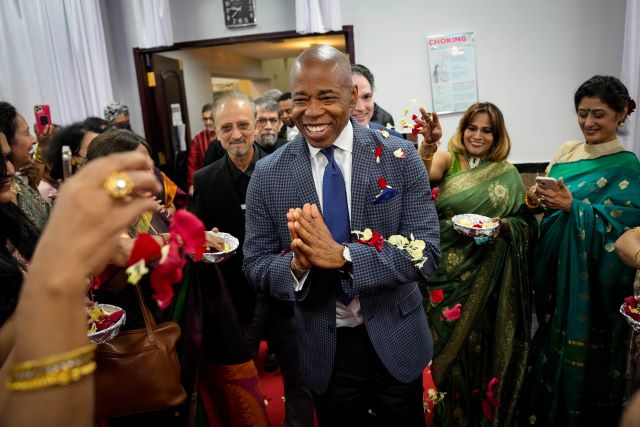
I did an interview with Mayor Eric Adams back in May and this first ran in The Week, one of India’s leading newsmagazines. I am now posting the profile and interview on Lassi with Lavina. One of the questions I had for the Mayor about Diwali becoming a school holiday has already been accomplished! My video interview and the link to The Week article is also published here. Read on!
Profile:
Mayor Eric Adams and the Reinvention of New York
[dropcap]I[/dropcap]n the comic book universe, Gotham City and Metropolis are safeguarded by masked superheroes with superpowers – but in real life, New York City, on which these fictional cities are based, is under the charge of its 110th mayor, Eric L. Adams, 62. An unlikely superhero, he has taken on all monsters, be it COVID, crime, inequality, financial downturns, racism and other evils that imperil a big city.
He has brought New York back from the brink of becoming a ghost city.
Eric Adams is a New Yorker’s New Yorker, having battled adversity and overcome real struggles. He and his five siblings were brought up by a single mother who cleaned homes to make a living. From being a failing D student who battled Dyslexia to finally making it to the Dean’s List, Adams has seen both sides of life, and managed to transform outcomes.
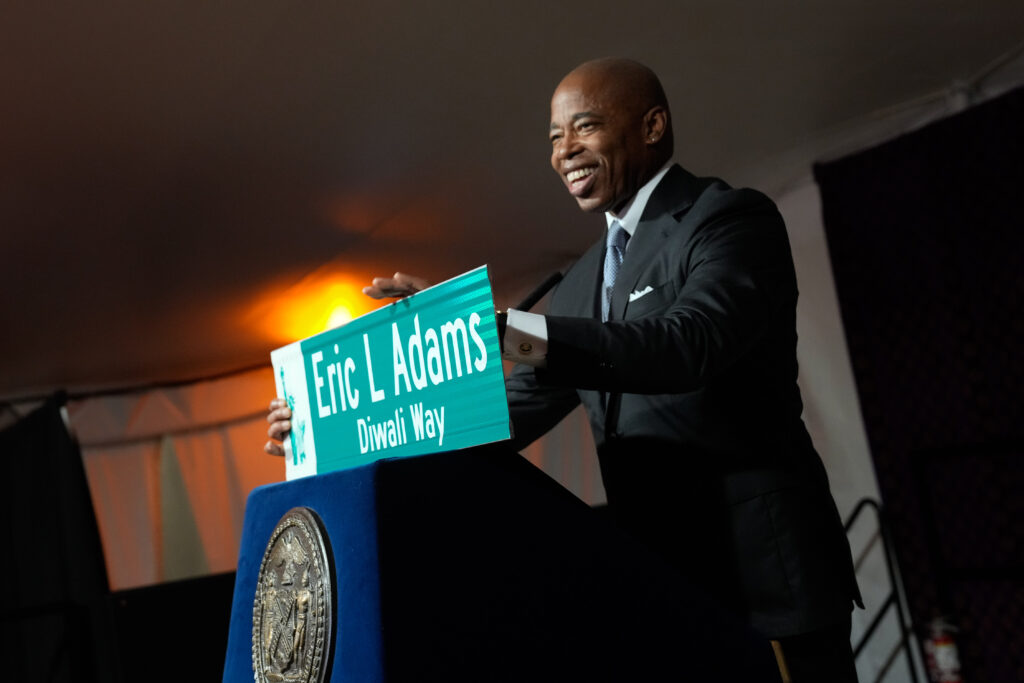
[dropcap]A[/dropcap]rrested and beaten as a teenager, he went on to combat injustice by joining the police force and rose to the rank of Captain. As a founder of 100 Blacks in Law Enforcement Who Care, he worked on changing the system from within. He later became a State Senator and was the first person of color to chair the Senate’s Homeland Security Committee. In 2013 he was elected Brooklyn Borough President and while working to bring diverse groups together, public policy and good government became his mantra.
Adams received his master’s degree in public administration from Marist College, and is a graduate of New York City Technical College and the John Jay College of Criminal Justice. His son Jordan is a filmmaker and graduate of American University.
It is said that when Eric Adams was growing up in Jamaica, Queens, he would often carry a plastic bag of belongings with him for he never knew if he may be returning to an eviction notice on their home. From that to being elected the Mayor of one of the world’s greatest cities has indeed been quite a journey.
Having walked in the shoes of everyman, he is able to identify with the problems the average New Yorker is facing. His own life has been a lesson which taught him what he would like to see changed in city government and he has tried to give a voice to disparate groups, regardless of race or income.
[dropcap]A[/dropcap]s mayor-elect, one of his first acts was to nominate five deputy mayors – all of them women, and two of them of Asian heritage. (Meera Joshi is his Deputy Mayor for Operations) He said at that time: “For us to ensure that this city recovers quickly while addressing the inequalities that plagued us well before COVID-19 struck, we must have top leadership that can both deliver for New Yorkers and is representative of New Yorkers. Representation matters. Perspective matters.”
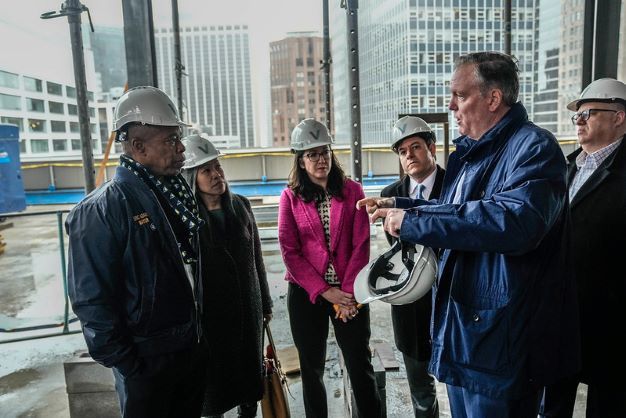
[dropcap]A[/dropcap]dams is all about taking creative action to solve problems. When he temporarily went blind in one eye and was told he had Type 2 diabetes, he took radical action, transforming his diet and losing 35 pounds. He reversed his diabetes and he adopted many healthful features as he writes in his 2020 book, “Healthy at Last: A Plant Based Approach to Preventing and Reversing Diabetes and Other Chronic Illnesses.” Health and wellness for all New Yorkers is an important part of his mandate, and he partners with organizations and experts to bring awareness about preventive care to schools and communities.
“When I walk into a Sikh temple or sit down at a Sukkah or go into a Diwali celebration, do you know how many people in this city have never left the geographical boundaries of the neighborhood they live in and the geographical boundaries of their mindset?” he once told a community gathering. “They only know people that look like them, talk like them, eat the same food, do the same things.” A passionate people’s person, he sees the universal in the local and aspires to unite diverse people, to get communities to talk with one another and connect.
[dropcap]A[/dropcap]ffordable housing is an acute problem in New York City but Adams says he’s set “a moonshot goal of building 500,000 new homes for New Yorkers over the next decade—and to achieve this goal we must fight for new housing, new zoning, and innovation.” This entails out-of-the-box thinking in converting office space lying vacant after the pandemic into apartments for daily living, keeping the business districts vibrant.
Indeed, searching for bold and creative ways to solve the problems of a big city seems to be the secret superpower of Mayor Eric Adams.
One-on-One Interview with New York Mayor Eric Adams
The Can-do Mayor Designs a City for Everyone
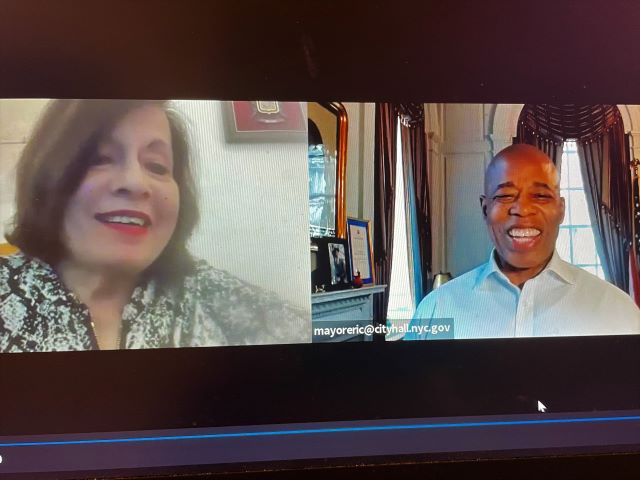
Q: The Indian-American community has been delighted that you are championing the cause of Diwali as a school holiday. How far have you come with that – will it be a reality this year?
A: You know, there are levels to bring in the success of the Diwali holiday home. The first level was to find a date that we could trade off with. And we did that. The Chancellor and I, and many others, even the UFT president, we all agreed to look at what was called Brooklyn Queens Day, and trade that off for the Diwali holiday, because there were no more days on the books. The state law requires the Department of Education to have a certain number of school days, and we had the maximum amount of holidays and days off, but we were able to creatively come up with the trade-off of what’s called the Brooklyn Queens Day.
We presented it to the state lawmakers, the amazing work of Assemblywoman Jenifer Rajkumar to move this forward. And now it’s up to the state lawmakers to actually vote on the change of moving it from the Brooklyn Queens Day to a Diwali holiday. We’re hoping they do it this session but is still in negotiation. I speak with Assemblywoman Rajkumar every day on this and she’s working hard and she’ll tell you that we did our half of the bargain. Now it’s time for the state lawmakers to do their half and we are optimistic that they are – we’re going to need real support to these last few weeks to get it done.
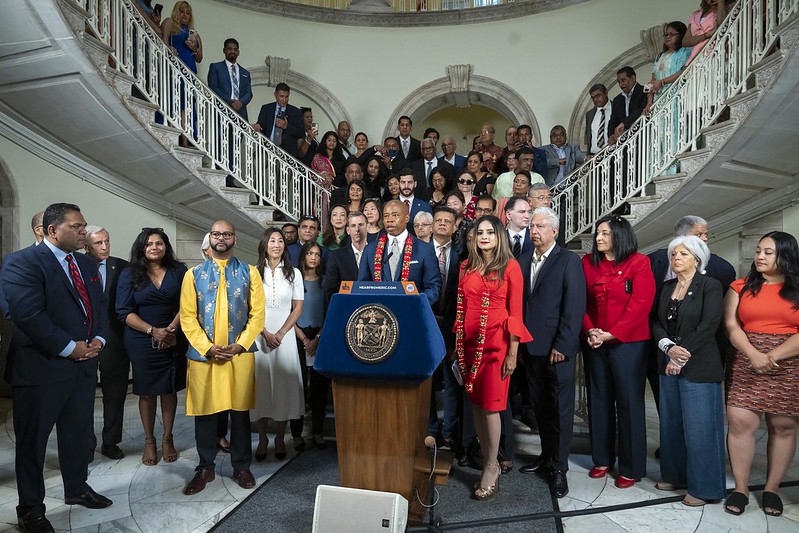
Q: So is there anything that ordinary people can do to make this a reality?
A: Everyone that has supported this should reach out to their elected senator and assembly person. This is not coming through the City Council, this is coming through Albany, so they should reach out and communicate to their senator and assembly person, their desire to see Diwali to be a school holiday. And their voices matter: Assemblywoman Rajkumar had an amazing rally up in Albany. Several hundreds of people showed up, and that’s what we need right now. If you live in an area you should know who your assembly person is and your senator and call them and voice your concern of making this a holiday.
Q: Mayor, as a former police officer, one of your campaign plans has been decreasing the crime rate, and that has happened. But while the shootings and homicides have indeed decreased, the assaults and robberies have risen. So how do you plan to address the situation?
A: Well, I think that it was so important. When we came into office, we saw an over proliferation of guns, homicides and shootings. Those were our primary focus – to make sure that we put in place the right police personnel to go after those guns. We took and removed over 8000 guns off the street since I’ve been the mayor, we saw shootings go down, we saw murders go down. But we’ve also seen something else: we’re seeing robberies go down. We’re seeing burglaries go down. We’re seeing grand larceny go down.
Our subways have become safer because of our subway safety plan. Our customer satisfaction surveys are showing that people are feeling safer on our system. They see the presence of police. In the areas where we arukk see an uptick is grand larceny auto and that has been driven by what’s called the Kia Challenge where young people looked at TikTok and they’re playing a game of stealing cars.
We announced yesterday that we are asking Kia and Hyundai to get a better safety system and encouraging people to go in and get their safety system installed on their cars. But we are moving in the right direction. Crime is going down, jobs are coming up and that is what we committed to and that’s what we’re moving toward.
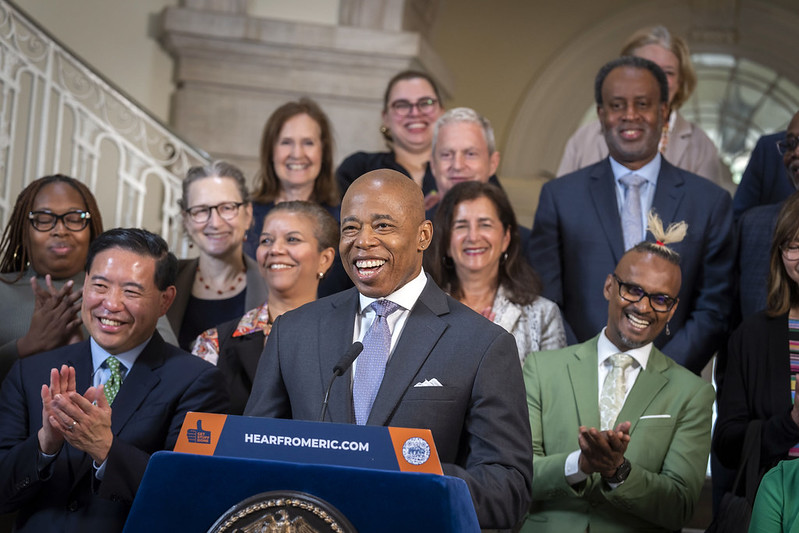
Q: What do you say about New York City’s financial forecast? It remains grim even as the federal COVID aid ends. So what is the post-COVID recovery plan being implemented by the city?
A: Well, it starts with efficiency. We went to our agencies when I first took office and stated we must do what everyday taxpayers are doing and just making sure that we balance the budget of our house, which are our agencies, like everyday taxpayers are balancing the budget of their homes.
You know, my mom used to say, this is the amount of money that comes in. This is the rent and if we’re going to spend something over what was taken in we need to decide what we’re going to take off the list. And that’s what we’re telling all of our agencies. We did something called the peg program to eliminate the gap, told the agencies to go in and .look for efficiencies.
We did two rounds of that. And we’re going to have to do another round because unexpectedly we were hit with a $4.2 billion bill from our asylum seekers. That money was not factored into how we’re going to deal with our budget crisis. And when you add that to the fiscal clip of the money that we were receiving from the federal government is going to run out next year. And so we must run our city more efficiently. And there’s going to be some pain to go around. But we’re not going to do away with services, we’re not going to do layoffs. We’re just going to find those efficiencies within our agencies and we’re committed to do so, as we deal with the other crises we’re facing.
We have to continue to settle union contracts that are long overdue. We have to settle everything from pre-K to childcare. We’re looking at all those things and making sure that we can continue to deliver a respectable product for our city – but it is going to take some real fiscal monitoring. You know the banking crisis we’re facing, what’s happening, but we are proud of the fact that the bond agency Fitch raised our bond to a Double A, based on how we are handling the financial crisis and how we are putting money in reserves to get prepared.
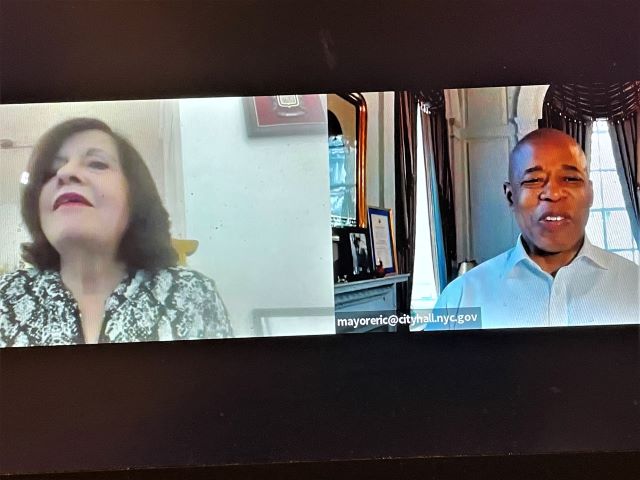
Q: So besides the post-COVID recovery plans what else are you implementing for the city?
We are really focusing on continued safety as we cycle out of COVID. All of us would admit that it caused serious mental health issues and we must address those issues. The number of suicides among young people has increased; the number of drug overdoses has increased. We’re looking at young people having a particularly hard time post-COVID. But we also want to look at our aging population, older adults. Loneliness is really part of the social determinants of health, and so we want to make sure we care for our older adults who have paved the way for us.
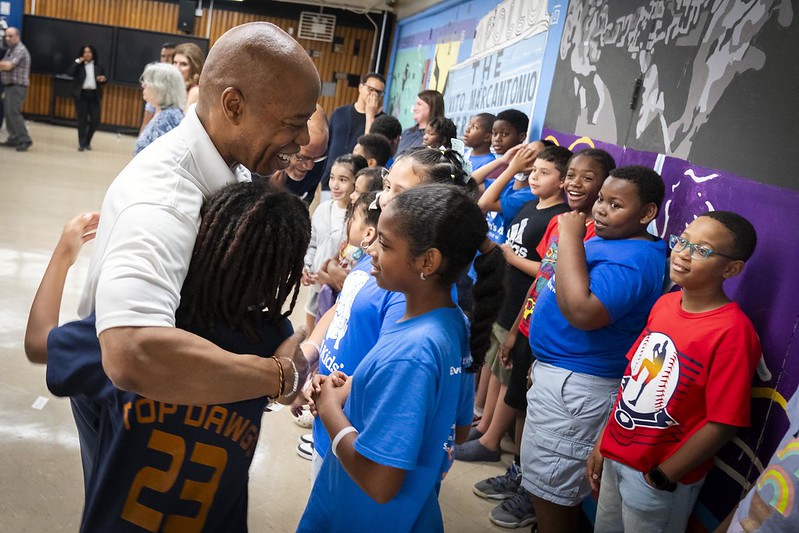
We also want to make sure our young people have a future, that they too can pave the way for the next generations. Our focus is on housing. And so in dealing with our mental health crisis, and continuing to make our city a safe city as we encourage people to come here, and we’re seeing financial success – 99% of all jobs we lost pre-pandemic – roughly 958,000 – we see are back; we are recovering jobs faster than any other municipality in the country.
We are also seeing new companies come here and open shop. JP Morgan is opening a new corporate headquarters. We’re seeing Pfizer, other great developments that are taking place and we’re leaning into biotech on 11th Avenue and on First Avenue. So there’s real excitement.
Tourism is up: 56 million tourists – we’re predicting 65 million this year, which is a major economic boost for us. So all the way around, people are back in the streets, you’re seeing them back in our restaurants, and Broadway is up and operating. So we’re excited. Financial recovery is going to be a difficult one but we know we’ve done it before, in 2008. We did it before that in 2001 and we know that this city is resilient and we’re excited about the future.
Q: Florida Governor Ron DeSantis said that the banks’ “woke preoccupation with diversity, equity and inclusion initiatives” caused them to fail. What are your thoughts on that?
Well, I think there were some mistakes made in some of the small banks, but I think the federal government responded appropriately to prevent a run on the banks. We were able to stabilize the situation and not allow more hemorrhaging because many of those small banks were lenders to our housing developments. And so it was imperative that we were able to put systems in place using the FDIC dollars to make sure that no depositor lost their money.
At the same time the investors in the small banks that didn’t make the right decisions, they were not bailed out. So this is the best way to do it. You want to bail out depositors whose savings are there. Those who made the wrong decisions – they were not bailed out. They were not protected. But I thank the federal government and the state government – my hats off to Governor Hochul for making the right decisions.
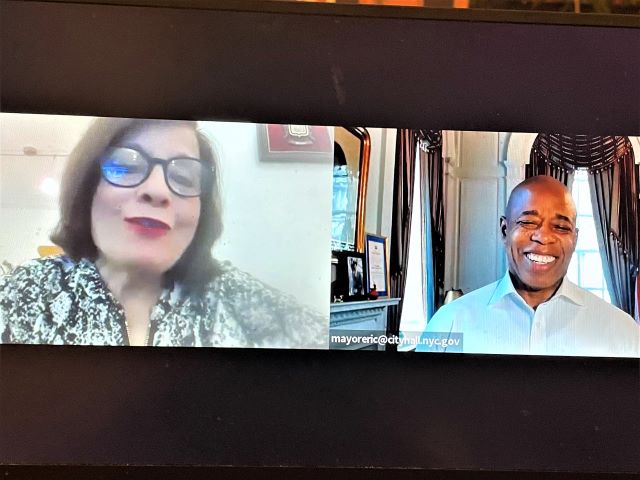
Q: You have often been called ‘the Hindu Mayor’ because of your affinity to all faiths. Good Hindus are supposed to love all religions, all people, and there’s yoga and vegetarian or plant based food. You seem to do so many of those things. Do you believe that these are universal ideas, that more people should be adopting them or at least you yourself are also adopting them?
A: Yes, I believe the universal principle of being kind, of being just, of being benevolent is more than just actually being a loyal worshiper – but is being a practitioner. That’s why I say the city should be a city where God is present. No matter how you define God, no matter what way – be it Buddha, through meditation, breathing; if it’s through Christ, Jehovah, any of the many deities that are worshiped in many different philosophies. It all is a universal tome.
When I sit inside a Sikh temple, when I sit inside a synagogue or church or mosque, I still feel that universal principle of kindness, of justice, of caring, of leaving that place of worship and going out and fulfilling our obligation as spiritual beings. We are not human beings in a spiritual place. We’re spiritual beings in a human place. And we need to continue to manifest that spirituality.
(This profile first appeared in The Week)
